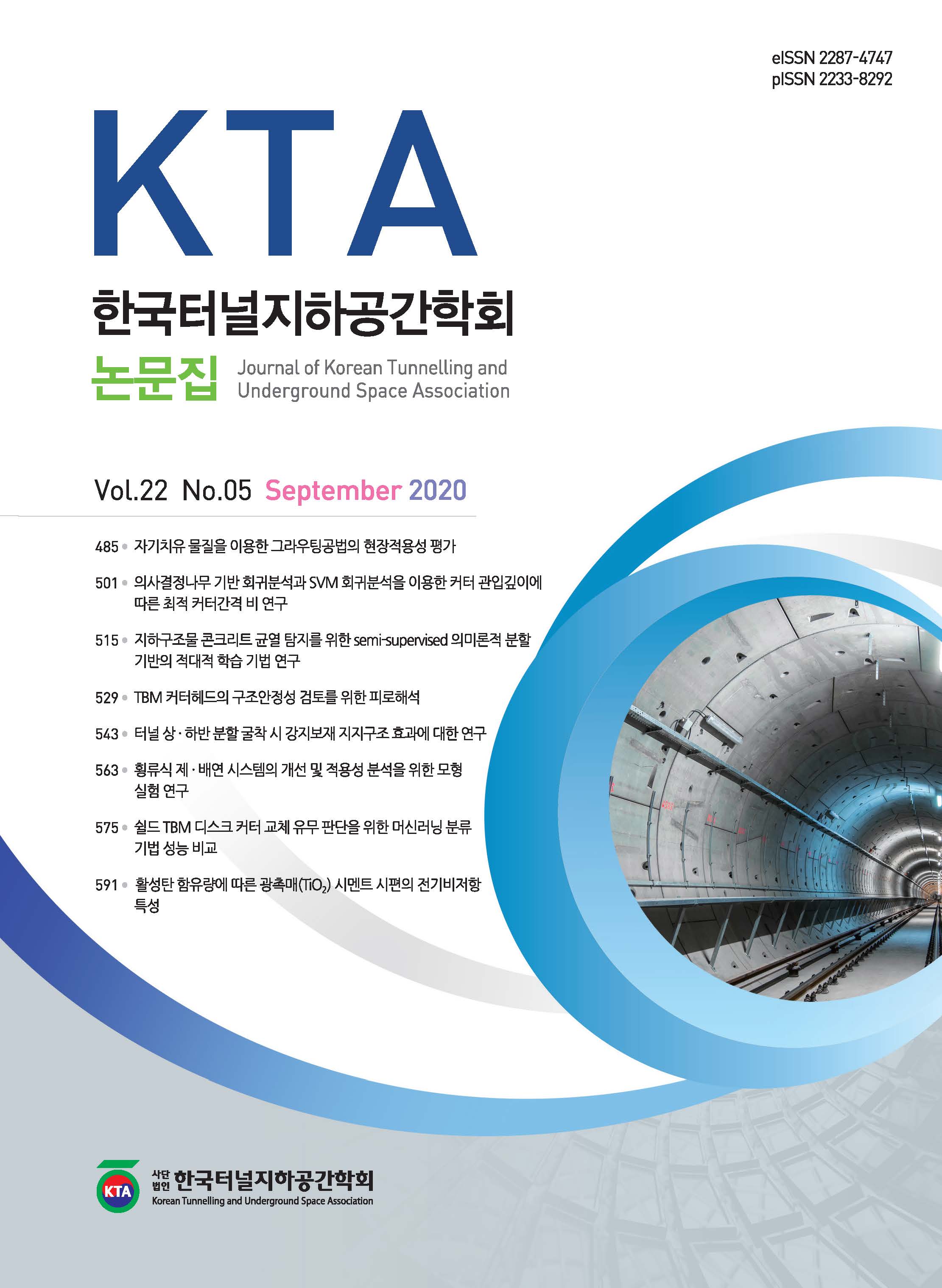(사)한국터널지하공간학회
- Log In/Sign Up
- P-ISSN2233-8292
- E-ISSN2287-4747
- KCI
 ISSN : 2233-8292
ISSN : 2233-8292
Article Contents
- 2024 (Vol.26)
- 2023 (Vol.25)
- 2022 (Vol.24)
- 2021 (Vol.23)
- 2020 (Vol.22)
- 2019 (Vol.21)
- 2018 (Vol.20)
- 2017 (Vol.19)
- 2016 (Vol.18)
- 2015 (Vol.17)
- 2014 (Vol.16)
- 2013 (Vol.15)
- 2012 (Vol.14)
- 2011 (Vol.13)
- 2010 (Vol.12)
- 2009 (Vol.11)
- 2008 (Vol.10)
- 2007 (Vol.9)
- 2006 (Vol.8)
- 2005 (Vol.7)
- 2004 (Vol.6)
- 2003 (Vol.5)
- 2002 (Vol.4)
- 2001 (Vol.3)
Analysis and cause of occurrence of lining cracks on NATM tunnel based on the precise inspection for safety and diagnosis - Part I
Abstract
A crack is the main cause to affect the integrity of tunnel lining as well as leakage, spalling, exposed rebar, corrosion, carbonation and so on. Since the 1980, NATM has prevailed on excavation method and geotechnical philosophy in tunnel. Although the pattern of cracks has been reported by several engineers’ effort, it was only focused on longitudinal cracks of lining. 11 operational NATM tunnels have been conducted with the precise inspection for safety and diagnosis by KISTEC (Korea Infrastructure Safety and Technology Incorporation). With those results, the crack patterns by the spatial distribution and appearance for each tunnel have been analyzed and the cause of occurrence for 7 common types of cracks in NATM tunnels was classified. Additionally, the longitudinal crack on lining above duct slab was figured out by numerical simulation and field inspection. Each crack has been analyzed by CCD(Charge- Coupled Device) scanner image with 3D configuration. Each type of cracks is also explained with output of experimental and condition of construction. Defined cracks on NATM tunnels will be good example for periodical inspection and precise inspection for safety and diagnosis.
- keywords
- NATM, 종균열, 횡균열, 사균열, CCD스캐너 이미지, NATM, longitudinal crack, transverse crack, oblique crack, operational tunnel, NATM, longitudinal crack, transverse crack, oblique crack, operational tunnel
Reference
1. 이대혁(1998), “모형실험 및 수치해석에 의한 터널 복공의 역학적 거동 및 균열특성에 관한 연구”, 서울대학교 공과대학 공학박사학위 논문, p. 292.
2. 한국시설안전기술공단(1997), “NATM터널(도로)의 종방향균열
3. (사)한국터널공학회(2009) “터널설계기준 해설서”, 도서출판 씨 ․ 아이 ․ 알.
4. 김완영(2008), “대단면 터널 라이닝 콘크리트의 균열저감 연구”, 가을 학술대회 논문집, 한국콘크리트학회, pp. 509~512.
5. 이유석, 박성우, 황인백, 신용석, 김순곤(2009), “공용중인 3-Arch터널의 열화조사 및 원인분석”, 터널기술, 한국터널공학회 논문집, 제11권, 제1호, pp. 97~105.
6. 민경환, 정형철, 양준모, 윤영수(2009), “대단면 터널 라이닝 적용 고성능 콘크리트의 수화열 특성”, 터널기술, 한국터널공학회 논문집, 제11권, 제1호, pp. 37~45.
7. 국토해양부(2008), “시설물의 안전관리에 관한 특별법령집”
8. 국토해양부(2003, 2009, 2010), “안전점검 및 정밀안전진단 세부지침(터널)”.
9. 정수매, 박인준(2009), “NATM 터널라이닝 종방향 균열 제어공법”, 터널기술, 한국터널공학회 논문집, 제11권, 제4호, pp. 437~447.
10. 김형탁, 조성우, 이재욱, 윤태국(2005), “병행 시공된 공동구로 인한 터널 콘크리트 슬래브의 균열발생사례연구”, 대한토목학회 정기학술대회, 터널, pp. 5559~5562.
11. 추진호, 박시현, 김홍균, 이상철, 윤태국(2010), “덕트슬래브를 지닌 도로터널의 종방향 균열원인 및 분석 사례”, 2010성과발표회 및 건설안전 포럼자료집, 한국시설안전공단.
12. Dov Kaminetzky (1991), “Design and construction failures lessons from forensic investigations”, McGraw-Hill, inc., pp. 107~202.
13. Janpanese Society of Civil Engineering (2003), “Tunnel Deformation Mechanism. Japanese”, Toyko, p. 320.
14. Tai-Tien Wang (2010), “Characterizing crack patterns on tunnel lining associated with shear deformation induced by instability of neighboring slope”, Engineering Geology, Vol. 115, pp. 80~95.
15. Seung-Nam Yu, Jae-Ho Jang, Chang-Soo Han (2007), “Auto inspection system using a mobile robot for detecting concrete cracks in tunnel”, Automation in Construction, Vol. 16, pp. 255~261.
16. Toshihiro Asakura, Yoshiyuki Kojima (2003), “Tunnel maintenance in Japan”, Tunnelling and Underground Space Technology, Vol. 18, pp. 161~169.
17. Hideto Mashimo, Nobuharu Isago, Tsutomu Kitani, Takuo Endou (2006), “Effect of fiber reinforced concrete on shrinkage crack of tunnel lining”, Tunnelling and Underground Space Technology, Vol.21, pp. 382~383.
18. S. Pelizza, C. Oggeri, P. Oreste, D. Peila (2000), “Damage causes and repair for tunnel lining: monitoring and analysis in practice”, Aites-Ita 2001 world tunnel congress, Vol. II, pp. 721~732.
19. Institution of Civil Engineering (1996), “Sprayed concrete linings(NATM) for tunnels in soft ground”, ICE design and practice guide, Thomas Telford, p. 88. 원인분석과 보수 ․ 보강공법 연구”
- Downloaded
- Viewed
- 0KCI Citations
- 0WOS Citations
